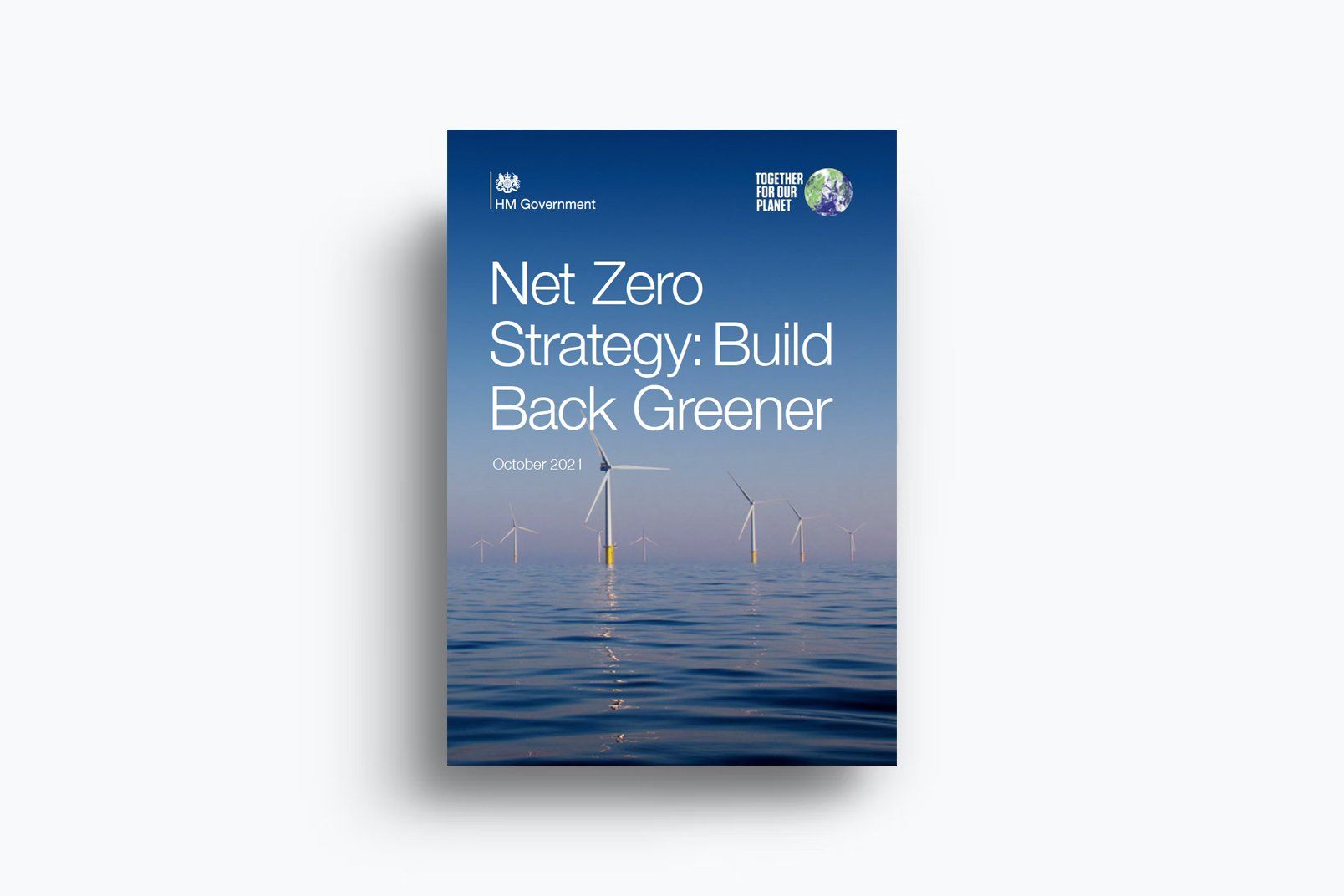
Net Zero Strategy: Build Back Greener
UK Government's Net Zero Strategy
This UK Government strategy sets out policies and proposals for decarbonising all sectors of the UK economy to meet our net zero target by 2050.

What is net zero and why do we need to act?
From heating our homes to filling up our cars, burning fossil fuels releases the greenhouses gases that increase global temperatures. We are already seeing the effects here in the UK, with devastating floods in the West Midlands last January and torrential downpours submerging London Underground stations last summer.
People are rightly concerned, with the latest IPCC report showing that if we fail to limit global warming to 1.5°C above pre-industrial levels, the floods and fires we have seen around the world this year will get more frequent and more fierce, crops will be more likely to fail, and sea levels will rise driving mass migration as millions are forced from their homes. Above 1.5°C we risk reaching climatic tipping points like the melting of arctic permafrost – releasing millennia of stored greenhouse gases – meaning we could lose control of our climate for good.
But the good news is that there is, still, a path to avoid catastrophic climate change. The science could not be clearer: by the middle of this century the world has to reduce emissions to as close to zero as possible, with the small amount of remaining emissions absorbed through natural carbon sinks like forests, and new technologies like carbon capture. If we can achieve this, global emissions of greenhouse gases will be ‘net zero’.
Delivering this requires urgent global action, including ending coal fired power generation, retiring petrol and diesel engines from all cars, and halting deforestation.

Why should the UK act first?
Since 1990 the UK has almost halved our greenhouse gas emissions. Thanks to the efforts of successive governments, we are almost half-way to ending the UK’s domestic contribution to man-made climate change, and in 2019 the UK became the first major economy in the world to legislate to finish the job with a binding target to reach net zero emissions by 2050.
We are proud to lead the world in ending our own contribution to climate change, not just because it is the right thing to do, but because we are determined to seize the unprecedented economic opportunity it brings. We want to build back better from the pandemic by building back greener and levelling up our country with new high skilled, high wage, sustainable jobs in every part of our United Kingdom.
Removing dirty fossil fuels will require the transformation of every sector of the global economy. It means no longer burning fossil fuels for power or heating; it means new ways of making concrete, cement, steel; it means the end of the petrol and diesel engine. These changes are already beginning to happen. Renewable energy is now the cheapest source of power across two-thirds of the globe. Clean, cheap power is already driving the decarbonisation of heavy industry around the world. Almost all major car companies are now developing or producing zero emissions vehicles as battery technology improves and costs reduce.
The question is whether the new clean machinery of the net zero future will be “made elsewhere” or “made in Britain”. By moving first, the UK can get ahead of the pack and make the birthplace of the industrial revolution the home of the new Green Industrial Revolution.
Indeed, as we produce more of our own electricity – from wind farms in the North Sea and state-of-the-art British nuclear reactors – families will be much better protected from energy price spikes caused by volatile international fossil fuel markets. At the same time, by getting ahead of the curve in driving down the costs of the latest clean technology, more consumers will enjoy more efficient cars and heating systems sooner. Furthermore, by accelerating the deployment of cheap renewable power, and rolling out further energy efficiency measures, government decarbonisation policies mean that the average consumer energy bill in 2024 will likely be cheaper than it would otherwise have been.
We have shown the world that green and growth go hand in hand, and as a result other countries are already following our lead with their own net zero targets. When the UK was confirmed as host of COP26, less than 30% of global GDP was signed up to net zero or carbon neutrality targets. Today, in part again because of UK leadership,

UK Strategy for Net Zero
Since 1990 the UK has reduced our greenhouse gas emissions by 44%, while growing our economy by over 75%. This strategy sets out this Government’s long-term plan to finish the job and end the UK’s domestic contribution to man-made climate change by 2050.
Although every study shows that the costs of inaction on climate are far greater, there will, of course, be costs to the investments needed to make this transition happen. So we will approach these with four key principles:
- We will work with the grain of consumer choice: no one will be required to rip out their existing boiler or scrap their current car
- We will ensure the biggest polluters pay the most for the transition through fair carbon pricing
- We will ensure that the most vulnerable are protected through Government support in the form of energy bill discounts, energy efficiency upgrades, and more
- We will work with businesses to continue delivering deep cost reductions in low carbon tech through support for the latest state of the art kit to bring down costs for consumers and deliver benefits for businesses.
This strategy is a long-term plan for a transition that will take place over the next three decades. Many of the policies in the strategy will be phased in over the next decade or longer. Given our success in decarbonisation to date we are confident in our approach, but this strategy does not intend to predict the exact shape of the British economy in 2050 and neither should it.
ecogozero is part of the Eco Group of companies.
© Eco Group 2022. All rights reserved.
Your privacy is important to us - we will never share you contact details with third parties. To view the Eco Group's privacy policy, please click here.



